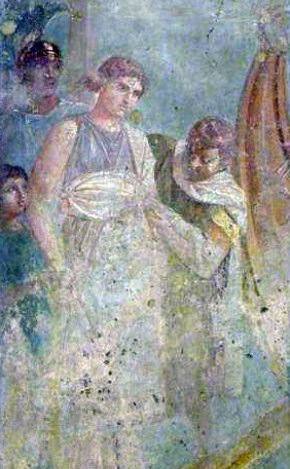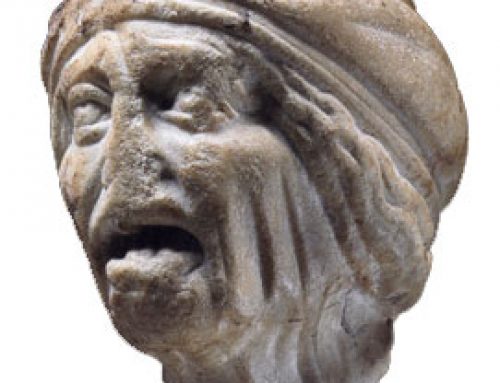
Kidnapping Helen of Troy (from Pompeii)
In ancient Greece, xenia meant “the way you treat strangers or foreigners”. It comes from a very old Proto-Indo-European (Yamnaya) word that means “stranger” but also “guest” and “host” and “foreigner” and sometimes “enemy”. Do those words all seem very different to you? That’s the point they’re making: that when a person shows up from somewhere else, they’re a stranger. For all you know, they might be dangerous. They might have come to kill you or steal from you.
But at the same time, civilization needs people to travel – traders, scientists, ambassadors, messengers. So we have to conquer our fear and behave in a friendly way towards strangers anyway. We’re good hosts, so we welcome strangers into our houses as guests. We give them food and a place to sleep. In return, guests are supposed to behave themselves too: they act grateful, not complaining. They don’t steal our things or hurt anybody. All of these ideas – the danger, the way the host behaves, the way the guest behaves- they’re all xenia. (The English words “guest” and “host” both come from the same root word as the Greek word xenia.)

Odysseus and his men put out the eye of the Cyclops, Polyphemos (ca. 660 BC)
Greek people told a lot of stories about the terrible things that happened to people who were bad hosts, or bad guests, to show how you should behave. The most famous story was about Helen of Troy: her husband Menelaus let Paris, a prince from Troy, stay at his house, and Paris kidnapped Menelaus’ wife Helen and took her back to Troy with him, starting the Trojan War (in which Paris was killed). But there are many other Greek stories about xenia. When Odysseus was away fighting the Trojan War, other men came and lived in his house, uninvited, and tried to force his wife Penelope to marry one of them. But Odysseus came home and killed them all. (See also the story of the Cyclops and Circe, who were terrible hosts).
In another set of stories, first Tantalus invited the gods to lunch and then served them his own son, Pelops (They weren’t fooled). Then when Pelops’ grandson Atreus had his brother Thyestes come over for lunch, he killed Thyestes’ children and served them to him as dessert – that’s terrible xenia.
As time went on, Greek city-states started to make official xenia agreements with specific people or families from other city-states, to make it safer and easier for traders and ambassadors to travel. These were like visa agreements in modern countries.
The Greeks weren’t alone in this concern. Other places had similar arrangements: the Akkadians and Hittites wrote letters about the importance of hospitality, and the Carthaginians made an agreement with the Romans to keep each other’s traders safe. The Bible stories of Lot and Rebecca at the well emphasize hospitality, and so does the Roman story of Baucis and Philemon, and so do the Anansi stories from Africa. But maybe xenia seemed most important to the Greeks, who lived in such small city-states that they were constantly crossing each others’ borders, and who also were a nation of sailors and traders, who travelled more than most people did.




